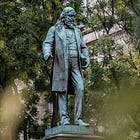|
"Competitive authoritarianism" and America's slide toward it
You can still vote. It just might not mean much.
Public Notice is supported by paid subscribers. Become one 👇
Last week, Trump announced that he wants to change the census so that it excludes undocumented immigrants. That’s unconstitutional. It’s also a way for Republicans to simply remove representation from populations that vote against them.
The change would be in line with Trump’s demand that red states engage in an orgy of mid-cycle gerrymandering aimed at allowing Republicans to increase the number of safe GOP seats and make it possible for them to hold onto the House despite their deeply unpopular policies. Trump and his MAGA toadies hate democracy and they have decided that elections are illegitimate — unless Republicans win.
Experts have argued that the United States is moving towards what they call “competitive authoritarianism.” Scholars Steve Levitsky and Lucan Way describe such systems as one that are not democratic but “feature arenas of contestation in which opposition forces can challenge, and even oust, authoritarian incumbents.”
Competitive authoritarianism is usually thought of as a new global development. However, you can also see competitive authoritarianism as a prevalent form of government throughout American history — one which we have only tentatively started to move away from in recent decades. Trump in that context is not an innovator, but an avatar of backlash.
The Orbán model
When experts talk about competitive authoritarianism, they are usually referring to countries like Hungary and Turkey. A leader is elected in a more or less democratic system — and then starts to work to break the democracy that put them in power.
For instance, Viktor Orbán, Hungary’s current fascistic leader, became prime minister (for the second time) back in 2010. Gábor Scheiring, a former member of Hungary’s Parliament, says Orbán subverted Hungary’s democracy by putting in place a “nationwide right-wing media network” and by “gerrymandering local districts.” Orbán put loyalists in the public prosecutor’s office, ensuring that the judicial system would go after his enemies rather than after government corruption. He also targeted universities.
Orbán has now been back in office 15 years, and while he has consolidated power, there is still resistance. His effort to outlaw the Pride parade in Budapest this year backfired, as tens of thousands of people took to the streets to support the LGBT community and express opposition to the regime. That was seen as a possible warning sign for Orbán in next year’s elections — though he’s also using the event as an excuse to target opposition figures who he accuses of helping to organize it.
As Scheiring notes, the parallels with Trumpism here are hard to miss.


